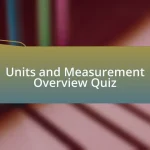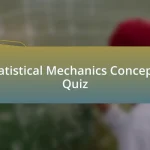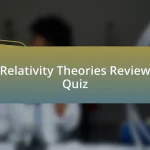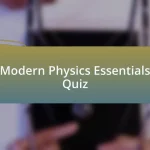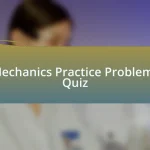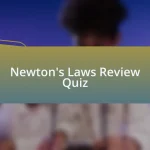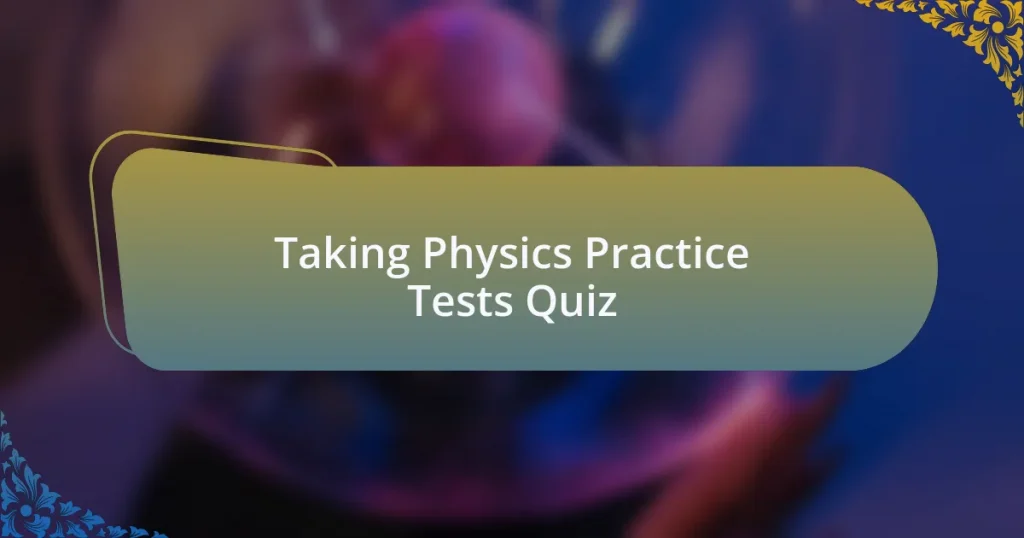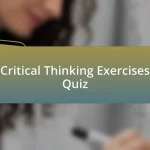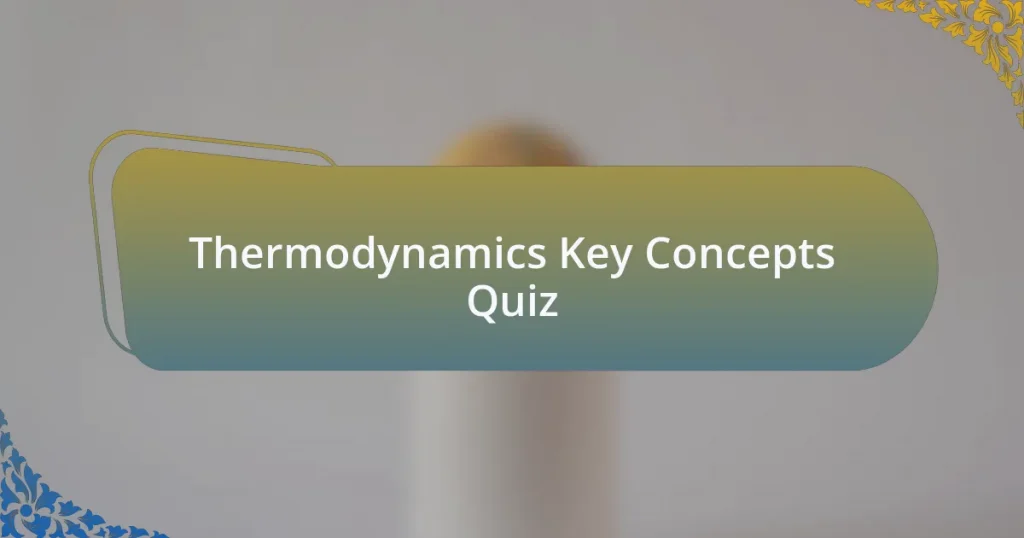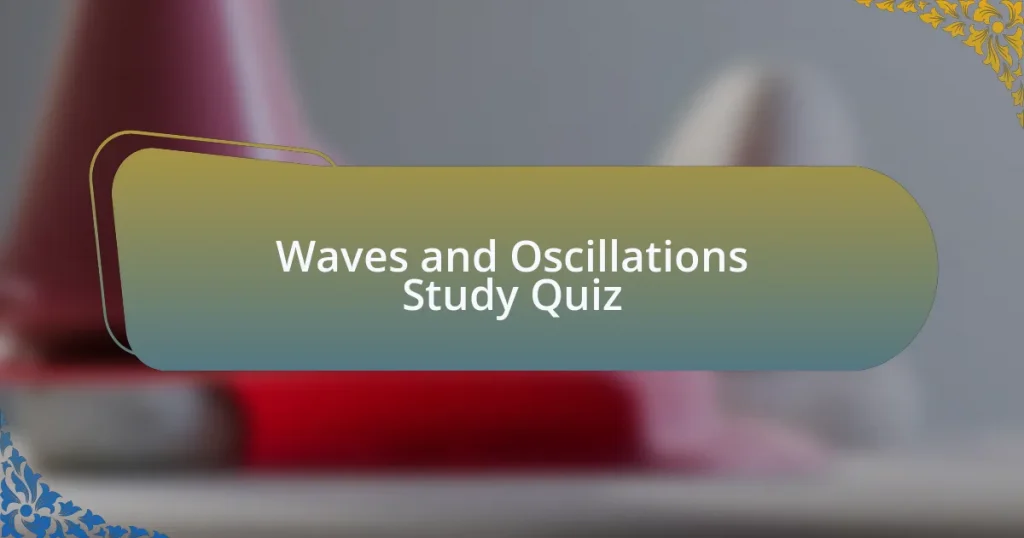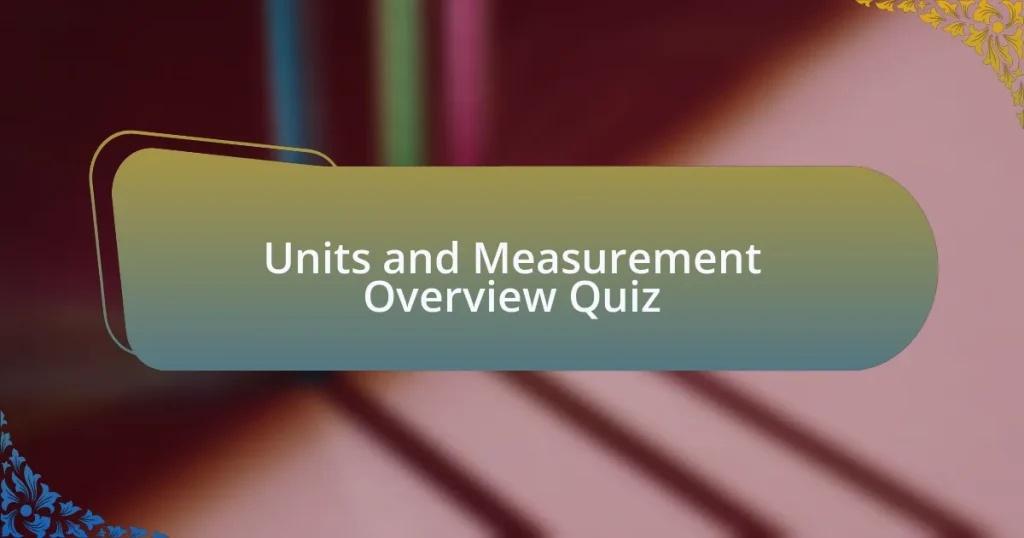Start of Taking Physics Practice Tests Quiz
1. What is the primary way to become proficient in solving physics problems?
- Reading textbooks.
- Practice.
- Watching video lectures.
- Memorizing formulas.
2. How can you start becoming familiar with High School Physics content?
- By reading novels about physics.
- By taking Varsity Tutors’ free High School Physics Practice Test.
- By watching physics documentaries.
- By attending unrelated science workshops.
3. How many questions are typically in a High School Physics Practice Test?
- Twenty to twenty-five questions.
- Fifteen to eighteen questions.
- Ten to twelve questions.
- Five to seven questions.
4. What is included with each High School Physics problem?
- An explanation of the correct answer.
- A multiple-choice format.
- A list of related topics.
- A summary of key formulas.
5. What can you do if you miss a problem on a High School Physics Practice Test?
- You can find out where you went wrong by reading the explanation of the correct answer.
- You can guess the answer and hope for a better score next time.
- You can ignore the problem and focus only on new topics.
- You can skip that problem and move on without reviewing.
6. How can you efficiently improve your High School Physics knowledge?
- By memorizing formulas without practice.
- By watching videos without taking notes.
- By only reading the textbook without solving problems.
- By paying particular attention to problems that you miss.
7. What is the average time spent on the Understanding circular motion practice test?
- 2 minutes
- 1 minute and 35 seconds
- 1 minute
- 45 seconds
8. How many questions are in the Understanding circular motion practice test?
- 3 questions.
- 8 questions.
- 5 questions.
- 10 questions.
9. What is the average time spent on the Understanding torque practice test?
- 1 minute.
- 1 minute and 30 seconds.
- 45 seconds.
- 2 minutes.
10. How many questions are in the Understanding torque practice test?
- 2 questions.
- 15 questions.
- 10 questions.
- 5 questions.
11. What is the average time spent on the Using circular motion equations practice test?
- 1 hour.
- 30 minutes.
- 45 minutes.
- 15 minutes.
12. How many questions are in the Using circular motion equations practice test?
- 40 questions
- 10 questions
- 25 questions
- 15 questions
13. What is the average time spent on the Gas laws practice test?
- 2 minutes
- 35 seconds
- 1 minute
- 5 minutes
14. How many questions are in the Gas laws practice test?
- 10 questions
- 12 questions
- 2 questions
- 5 questions
15. What is the average time spent on the Understanding isovolumetric processes practice test?
- 43 seconds
- 50 seconds
- 2 minutes and 30 seconds
- 1 minute and 15 seconds
16. How many questions are in the Understanding isovolumetric processes practice test?
- 2 questions
- 3 questions
- 4 questions
- 1 question
17. What is the average time spent on the Harmonic motion practice test?
- 2 hours
- 30 minutes
- 45 minutes
- 1 hour
18. How many questions are in the Harmonic motion practice test?
- 40 questions
- 25 questions
- 10 questions
- 30 questions
19. What is the average time spent on the Energy of shm practice test?
- 6 minutes
- 3 minutes
- 10 minutes
- 15 minutes
20. How many questions are in the Energy of shm practice test?
- 5 questions
- 10 questions
- 7 questions
- 12 questions
21. What is the average time spent on the Period of shm practice test?
- 1 minute and 30 seconds.
- 40 seconds.
- 5 minutes.
- 3 minutes.
22. How many questions are in the Period of shm practice test?
- 10 questions.
- 8 questions.
- 12 questions.
- 6 questions.
23. What is the average time spent on the Understanding pendulums practice test?
- 30 seconds
- 45 seconds
- 22 seconds
- 1 minute
24. How many questions are in the Understanding pendulums practice test?
- 10 questions.
- 1 question.
- 20 questions.
- 5 questions.
25. What is the average time spent on the Understanding springs practice test?
- 1 minute and 30 seconds.
- 4 minutes and 15 seconds.
- 3 minutes and 45 seconds.
- 2 minutes and 8 seconds.
26. How many questions are in the Understanding springs practice test?
- 4 questions.
- 1 question.
- 2 questions.
- 10 questions.
27. What is the average time spent on the Using pendulum equations practice test?
- 1 minute and 1 second.
- 2 minutes and 30 seconds.
- 3 minutes.
- 45 seconds.
28. How many questions are in the Using pendulum equations practice test?
- 3 questions.
- 15 questions.
- 10 questions.
- 5 questions.
29. What is the average time spent on the Using spring equations practice test?
- 7 minutes
- 9 minutes
- 12 minutes
- 5 minutes
30. How many questions are in the Using spring equations practice test?
- 25 questions.
- 10 questions.
- 19 questions.
- 15 questions.
Congratulations on Completing the Quiz!
You’ve successfully completed the quiz on ‘Taking Physics Practice Tests.’ This is a notable achievement in your journey towards mastering physics. Engaging with the quiz has likely sharpened your understanding of key concepts and strategies that can enhance your test preparation. Each question you tackled helped reinforce vital knowledge and highlighted areas for further study.
Throughout the quiz, you may have learned about the importance of time management during practice tests, effective study techniques, and how to approach different types of physics problems. Recognizing your strengths and weaknesses in these areas is crucial. It equips you with the skills needed to excel not just in practice tests, but also in actual physics examinations.
We invite you to continue this learning adventure! Head over to the next section on this page, where you will find more in-depth information on ‘Taking Physics Practice Tests.’ This resource is designed to further expand your knowledge and provide you with valuable insights. Dive in and discover more strategies to improve your physics test preparation!
Taking Physics Practice Tests
Importance of Taking Physics Practice Tests
Taking physics practice tests is crucial for effective test preparation. These tests enable students to assess their understanding of key concepts and identify areas that require improvement. Engaging with practice questions simulates the actual testing environment, reducing anxiety and enhancing performance. Research shows that consistent practice leads to better retention of information and improved problem-solving skills in physics.
Types of Physics Practice Tests Available
Various types of physics practice tests cater to different learning needs. These include multiple-choice tests, free-response questions, and mixed-format tests. Each type encourages different strategies for problem-solving and critical thinking. Multiple-choice tests assess straightforward knowledge, while free-response questions require deeper analytical skills. Mixed-format tests combine both styles, offering a comprehensive review of a student’s capabilities.
Effective Strategies for Taking Practice Tests
To maximize the benefits of physics practice tests, students should employ effective strategies. First, time management is essential. Allocating appropriate time to each question helps replicate test conditions. Second, students should review the explanations for both correct and incorrect answers after completing the test. This reflection reinforces learning and clarifies misunderstandings. Lastly, regular intervals of practice enhance familiarity with content and test structure.
How to Analyze Performance on Practice Tests
Analyzing performance on practice tests is key to improving future outcomes. Students should track which topics are frequently missed and prioritize those in their study sessions. Scoring trends over time reveal progress and highlight persistent weaknesses. Utilizing analytics tools that many online platforms provide can streamline this review process, allowing for focused remediation on challenging concepts.
Resources for Finding Quality Physics Practice Tests
Many resources offer quality physics practice tests for preparation, including textbooks, online platforms, and educational institutions. Websites such as Khan Academy and AP Classroom provide structured practice aligned with curriculum standards. Additionally, university physics departments often release past exams for student use. These resources ensure students have access to varied questions that cover the breadth of physics topics.
What are Physics Practice Tests?
Physics practice tests are assessments designed to help students understand and apply fundamental concepts in physics. They typically include a range of questions that cover various topics such as mechanics, thermodynamics, and electromagnetism. These tests aid in identifying areas of strength and weakness, allowing for targeted studying. Research shows that practice tests enhance retention and understanding of material, as they require active recall, a technique proven to boost memory and comprehension in learners.
How can taking Physics Practice Tests improve exam performance?
Taking physics practice tests can significantly improve exam performance by reinforcing knowledge and identifying gaps in understanding. This method promotes active learning, as students engage with the material more deeply. According to studies, students who regularly take practice tests score higher on actual examinations due to increased familiarity with test formats and types of questions. This reinforces problem-solving skills applicable in timed conditions, similar to those experienced in real exams.
Where can students find Physics Practice Tests?
Students can find physics practice tests in various places, including educational websites, textbooks, and online platforms dedicated to academic resources. Websites such as Khan Academy and Physics Classroom offer free practice problems and tests. Many standardized test prep books, like those for the SAT or ACT, also include physics sections with practice tests. These resources provide necessary material for students preparing for physics examinations.
When should students take Physics Practice Tests?
Students should take physics practice tests at various intervals throughout their study schedule. These should be administered after completing major units or chapters to assess understanding. Additionally, practice tests should be taken in the weeks leading up to an exam to gauge readiness and reinforce learning. Timing practice tests to closely follow study sessions aids in cementing knowledge and improving retention.
Who can benefit from taking Physics Practice Tests?
High school and college students studying physics can benefit from taking practice tests. This method is especially advantageous for those preparing for standardized tests such as AP Physics, SAT Subject Tests, or college entrance exams. Additionally, anyone seeking to strengthen their understanding of physics concepts, including non-traditional learners or individuals in STEM fields, can gain value from these assessments. Multiple studies indicate that students engage more effectively with material when utilizing practice tests as a learning tool.


